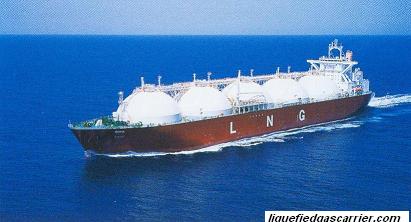

Home page|||
LNG handling |||
LPG handling||| Other Gas products|||
Fire & Safety|||
Emergency response |||
The conditions for rollover during laden voyage of LNG carriers
A danger associated with cargo density is the phenomenon of rollover. The conditions for rollover are set when a tank’s liquid contents stratify so that a heavier layer forms above a less-dense lower layer. Rollover is the spontaneous mixing which takes place to reverse this instability. Rollover, in either a ship or shore tank, can result in boil-off rates ten times greater than normal, causing over-pressurization, the lifting of relief valves and the release to atmosphere of considerable quantities of vapours or even two-phase mixtures.
When the cargo tank is kept closed during loaded voyage, the BOG rate naturally drops. The flow of heat into cargo tanks influences to raise the liquid temperature and as this result involves the danger of leading to an excessive temperature difference between the liquid LNG on board and that in receiving cargo tanks ashore, causing a rollover in such shore tanks. The maintenance of high tank pressure on loaded voyage has a limitation in this sense, too.
.

Related Information:
-
Liquefied gas carrier safety training
- Drying of Cargo Tanks and preparation for loading LNG cargo
- Inerting of Cargo Tanks prior loading LNG cargo
- Gassing-up requirement for cargo tanks
- Initial Cool Down of cargo tanks
- Increased Cargo Capacity for LNG ships & Advantages of the dual fuel diesel electric propulsion
Defining various gas carrier types
Fuel flexibility of LNG ships
LNG ship spillage risk
LNG shipment
Initial Cool Down of cargo tanks
Leaks on the Cargo System, Continuous Flow - how to prevent
LNG tank leaks and immediate action by gas carriers
Leaks from a Loading Arm due to Tidal or Current Effects
Minor or major leaks from LNG tanks
Procedures for LNG cargo loading
Procedures for LNG cargo discharging
External links :
-
IMO publications

// Home page///
LNG handling ///
LPG handling///
Sea transport ///
Gas products///
Cargo work
///Fire precautions
///Health hazards
///Safety Precautions
///Emergency response ///

Copyright © Liquefied Gas Carrie.com All rights reserved.
The content published in this website are for general reference only. We have endeavoured to make the information
as accurate as possible but cannot take responsibility for any errors. For latest information please visit www.imo.org .
Any suggestions, please Contact us !
///Links &Resources //
Terms of use///
Privacy policy///Home page///
